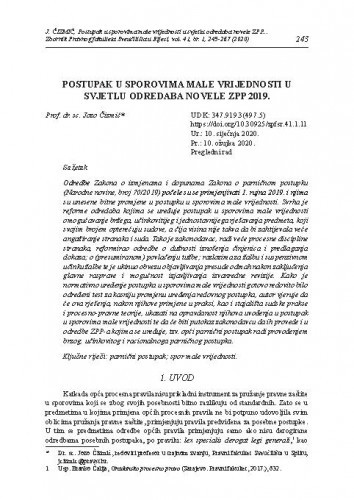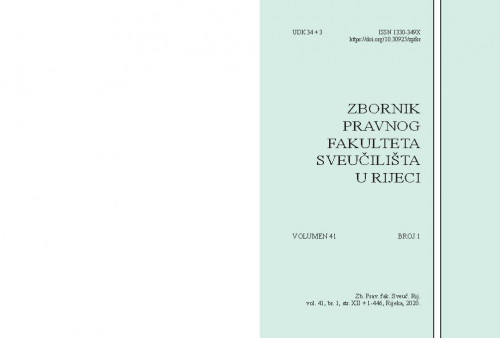Odredbe Zakona o izmjenama i dopunama Zakona o parničnom postupku (Narodne novine, broj 70/2019) počele su se primjenjivati 1. rujna 2019. i njima su unesene bitne promjene u postupku u sporovima male vrijednosti. Svrha je reforme odredaba kojima se uređuje postupak u sporovima male vrijednosti omogućavanje bržega, učinkovitijeg i jednostavnijega rješavanja predmeta, koji svojim brojem opterećuju sudove, a čija visina nije takva da bi zahtijevala veće angažiranje stranaka i suda. Tako je zakonodavac, radi veće procesne discipline stranaka, reformirao odredbe o dužnosti iznošenja činjenica i predlaganja dokaza; o (presumiranom) povlačenju tužbe; razlozima za žalbu i suspenzivnom učinku žalbe te je ukinuo obvezu objavljivanja presude odmah nakon zaključenja glavne rasprave i mogućnost izjavljivanja izvanredne revizije. Kako je normativno uređenje postupka u sporovima male vrijednosti gotovo redovito bilo određeni test za kasniju promjenu uređenja redovnog postupka, autor vjeruje da će ova rješenja, nakon njihove primjene u praksi, kao i stajališta sudske prakse i procesno-pravne teorije, ukazati na opravdanost njihova uvođenja u postupak u sporovima male vrijednosti te da će biti putokaz zakonodavcu da ih provede i u odredbe ZPP-a kojima se uređuje, tzv. opći parnični postupak radi provođenjem brzog, učinkovitog i racionalnoga parničnog postupka.; On September 1, 2019, the provisions of the Law on Amendments to the Civil Procedure Act (Official Gazette, No. 70/2019), which, among other things, introduced significant changes in the small claims procedure, became applicable. The purpose of reforming the provisions governing small claims litigation is to enable faster, more efficient and simpler solving of cases that burden the courts with a number that is not such as to require significant involvement of the parties and the court. Thus, for the cause of greater procedural discipline of the parties, the legislature reformed the provisions on the duty to present facts and present evidence; the (presumed) withdrawal of the claim; the grounds for appeal and the suspensive effect of the appeal, and abolished the obligation to publish the judgment immediately after the closing of the main hearing and the possibility to file an (so called) extraordinary revision in these disputes. As the normative regulation of the small claims procedure was almost regularly a specific test for the subsequent change in the regulation of the ordinary proceedings, we believe that these legal solutions, after their implementation in practice and the standpoints of case law and procedural law theory, will indicate the justification of their introduction in small claims disputes and will be a signpost to the legislator to implement them in the provisions of the Law on civil procedure, which regulates the so-called general litigation, all for the purpose of conducting prompt, efficient and rational litigation.; Am 1. September 2019 sind die Bestimmungen des Gesetzes über Änderungen und Ergänzungen der Zivilprozessordnung (Amtsblatt der Republik Kroatien Nr. 70/2019), mit welchen man das Verfahren bei Bagatellstreitigkeiten wesentlich geändert hat, in Kraft getreten. Der Zweck dieser Reform des Verfahrens bei Bagatellstreitigkeiten war, das Beilegen von Streitigkeiten, die durch ihre Zahl die Gerichte überfordern, aber deren Wert kein großes Engagement der Parteien und des Gerichts fordert, schneller, effektiver und einfacher zu machen. Deshalb hat der Gesetzgeber wegen größerer Disziplin der Parteien im Prozess die Bestimmungen über die Plicht der Darstellung von Tatsachen und des Vorschlagens von Beweisen, die (präsumierte) Klagerücknahme, die Berufungsgründe und die aufschiebende Wirkung der Berufung reformiert. Ebenfalls hat er die Pflicht der Urteilsverkündung gleich nach dem Schließen der Hauptverhandlung und die Möglichkeit der außerordentlichen Revision in diesen Streitigkeiten aufgehoben. Da die normative Regelung von Bagatellstreitigkeiten fast immer ein Test für nachträgliche Änderung des ordentlichen Verfahrens war, ist der Autor der Meinung, dass die Anwendung dieser Bestimmungen in Praxis sowie auch die Stellungen der Rechtsprechung und prozessrechtlichen Theorie auf eine rechtfertigbare Einführung dieser Bestimmungen in das Verfahren bei Bagatellstreitigkeiten hinweisen. Ebenfalls ist das ein Wegweiser für den Gesetzgeber, diese Bestimmungen auch in dem Teil der Zivilprozessordnung, in welchem man den sog. allgemeinen Zivilprozess regelt, zu implementieren, alles mit dem Ziel, den Zivilprozess schneller, effektiver und rationaler zu machen.; Le disposizioni della novella della Legge sul processo civile (Gazzetta Ufficiale n. 70/2019) sono entrate in vigore al 1° settembre 2019 e con esse sono state introdotte modifiche importanti nel processo delle controversie di modico valore. Lo scopo della riforma delle disposizioni con le quali si regola il processo delle controversie di modico valore è di consentire la soluzione dei casi in modo più veloce, efficace e semplice, posto che tali controversie opprimono a causa del loro elevato numero le corti, non richiedendo un tanto grande impegno né alle parti, né alla corte. A tale fine il legislatore per imporre una maggiore disciplina processuale alle parti, ha riformato le disposizioni sull’obbligo della presentazione dei fatti e della produzione delle prove; sulla (presunzione) del ritiro della domanda; sulle ragioni per l’azione e sull’effetto sospensivo della domanda, eliminando l’obbligo della pubblicazione della sentenza subito dopo la conclusione della fase del dibattimento e la possibilità di richiedere una revisione straordinaria. Siccome la regolazione normativa del processo nelle controversie di modico valore è stata quasi sempre un banco di prova per la successiva modificazione del procedimento ordinario, l’autore crede che queste soluzioni, dopo la loro applicazione nella prassi, come anche le opinioni della giurisprudenza e della dottrina processualista, dimostreranno la fondatezza della loro introduzione nel processo delle controversie di modico valore e che esse saranno un orientamento per il legislatore per la loro introduzione anche nelle disposizioni dello LPC nelle quali si regola il cosiddetto processo civile generale ai fini di condurlo velocemente, efficacemente e razionalmente.
Sažetak

 Zbornik Pravnog fakulteta Sveučilišta u Rijeci : 41,1(2020) / glavni urednik Željko Bartulović.
Zbornik Pravnog fakulteta Sveučilišta u Rijeci : 41,1(2020) / glavni urednik Željko Bartulović.